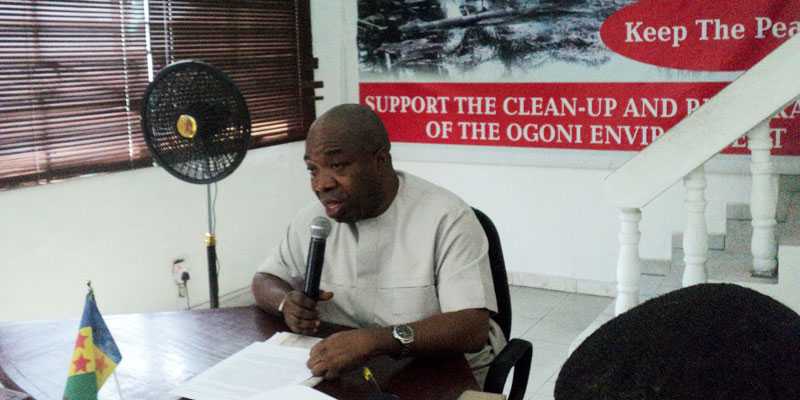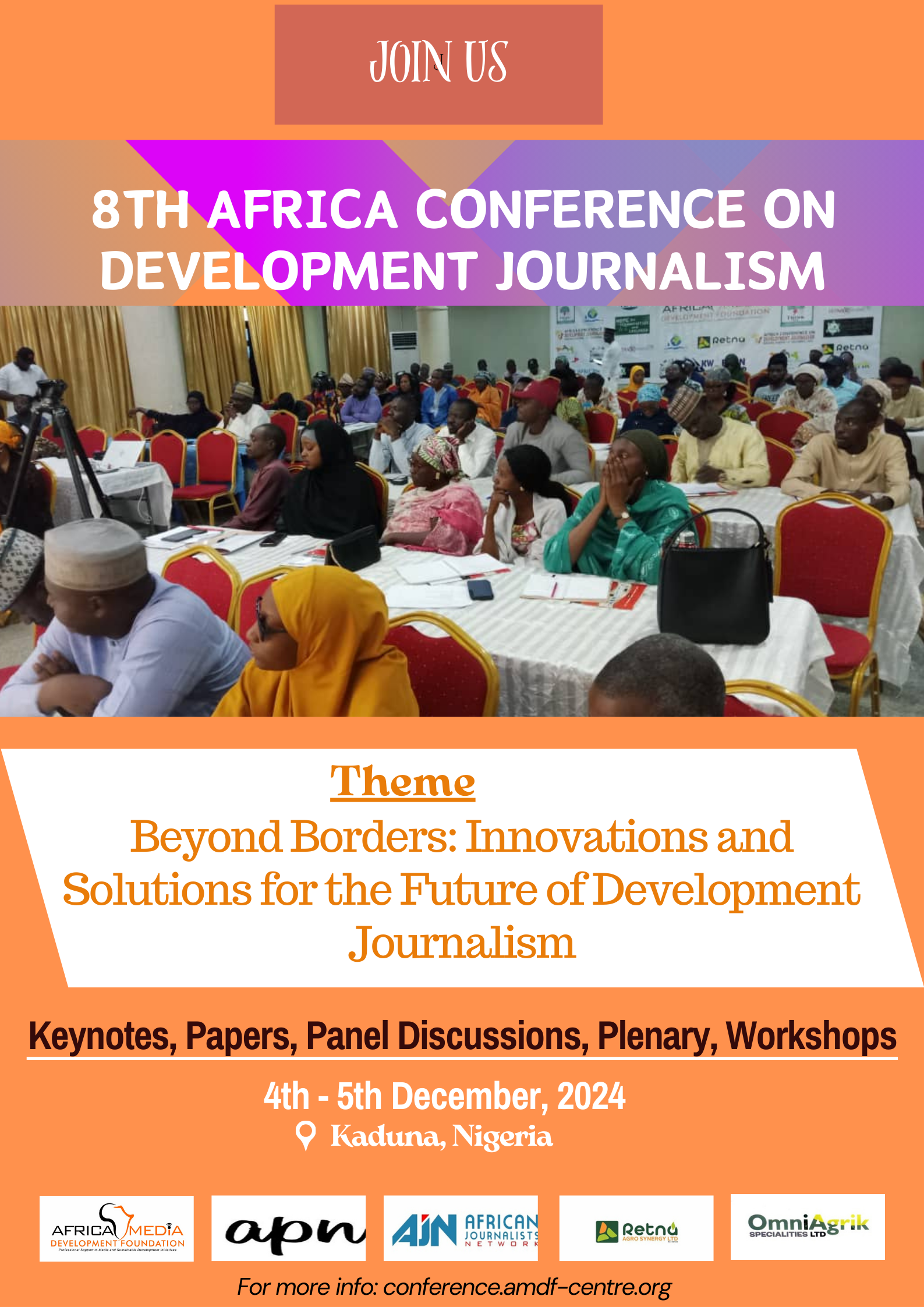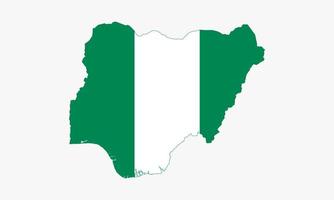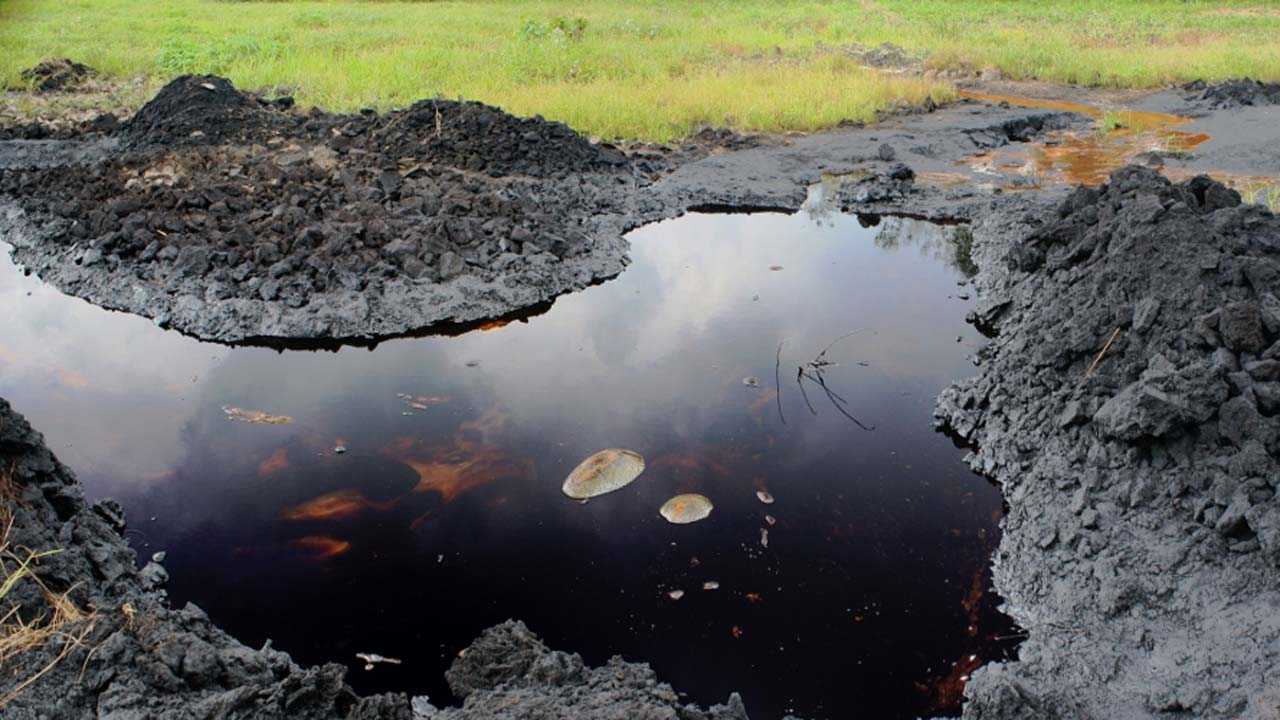
Between 1970 to 2018, the Niger Delta region has recorded over 10,000 oil spillages and hardly were the affected communities compensated or quick clean-up of the affected communities impacted,Odimegwu Onwumere writes
Oil spill has become a recurring decimal in the Niger Delta region since 1956 that oil was first found in Nigeria.
The country was then a British protectorate and the oil was found by a joint operation between Royal Dutch Shell and British Petroleum.
Investigations have shown that the country has recorded over 10,000 spills between 1970 to 2018 and hardly, were the affected communities compensated.
There have been incessant oil spills in Ogoni and by extension, the Niger Delta region, leading to thousands of litres running on Ogoni farmlands and rivers.
There was a major spill in 1970 which led to a £26m fine for Shell in Nigerian courts 30 years latter, and the authorities were recalcitrant to the plight of the victims of the disaster.
Besides this, just on May 17 2018, over fifty fishing settlements in Bayelsa community of Niger Delta were destroyed by oil spill.
The incident occurred in Aghoro 1 and 2 communities, hosting an oilfield operated by Shell Petroleum Development Company (SPDC) in Ekeremor Local Government Area of Bayelsa.
The story of the spill was confirmed by the Oil and Gas Producing Areas Enlightenment and Empowerment Initiative (OGPAEEI), an NGO in Bayelsa.
This was as Nembe Creek community in Nembe Local Government Area of Bayelsa State called on federal and state governments to look into the delay of AITEO Production and Exploration Company in cleaning up an oil spill that was destroying farmlands in the area since 2016.
The Amanyanabo of Nembe Creek Community, Chief Kemmer Igbeta, and Vice Chairman of United Nembe Creek Fishermen Association in Yenagoa, was not pleased with the situation.
According to a statement from the community in April 2018, “The reckless activities of the company have endangered the health of our people, while the sources of drinking water are all damaged.
“We wish to notify the public, as a demonstration of our commitment to peace, of our frustrations and disappointment at AITEO Production and Exploration’s indifference and nonchalant attitude to the plight of the people of Nembe Creek communities, precipitated by AITOE’s exploration and production operations at Nembe creek oil fields.”
In Odimodi Community in Burutu Local Government Area of Delta State, there was a devastating oil spillage that occurred on the 24 inches Trans Ramos crude oil pipeline owned by the SPDC.
The crude oil spillage spread to over fifty communities under the Odimodi Federated Communities and others in the creek.
Dr. Anapunere Awoli, Spokesman of the OGPAEEI, speaking to our correspondent on behalf of the President of the group, Mr. Jackson Igbabiri, in Yenagoa, disclosed that the spill in Aghoro was devastating as sources of water and farmland and fishing tools worth millions of Naira were destroyed.
He added that communities in Aghoro 1, were most greased with the spillage and they included Garden of Eden, Aya Ama, Famous Ama, Azatitor and Birigbene and so many others.
According to Igbabiri, “From the assessment we conducted on the incident, we found out that about 10,000 fishing nets, over 50 fishing settlements, farmlands including coconut farms, plantain and water yam farms were destroyed by the spill.
“Some of the fishing settlements in the area are Amasese, Idolo, Semetiegbe, Yoba, Agoloudu, Ama Iyorodtugbene, and Isun Adofeye camp, among others.”
He went further, “We are calling on SPDC to urgently provide alternative sources of water like borehole for the people; the people are also in dire need of medical aid and food items; the situation can lead to public health challenges if not taken care of.
However, His Majesty, King Enimikem Famous, the traditional ruler of Famous Ama Community in Aghoro, was not pleased with the incident. He described it as “unfortunate”.
In his words, “We have suffered too much of spills; our people have suffered from several illnesses such as cholera, severe cough and infertility caused by the type of water we consume.”
The Bayelsa State Government, through the Deputy Governor Gboribiogha Jonah led a delegation that visited the affected areas and admonished the SPDC to embrace international oil practice standard to avert further spillage.
Conversely, Dr. Alice Aje, Manager, Stakeholder Relations at SPDC, described the spill as “regrettable”.
But this is primary to disasters that Ogoni people have been suffering for years in the hands of multinational oil companies operating in the Niger Delta region.
UNEP Rescues Ogoni
It was the umpteenth time that this writer has to investigative disasters occurring from oil spillage that the people of Ogoni have come to endure for decades.
The Ogoni people are in shadow of the negative impact of crude oil explorations by multinational oil companies in their land.
The SPDC was at the centre of the environmental degradations that Ogoni are suffering till date.
The company operated in Ogoni without any development or implementation of environmental assessment methodologies. It did not take into account the economic, socio-cultural and conservation values of the environment in Ogoni.
The observation with Environmental Impact Assessment Laws was zero, so also was the implementation of health safety and environmental management systems and quality assurance control, as oil production began in the Delta in 1956.
While Ogoni Suffer
Nigeria as a colony of the rapacious British Empire, the imperialist gave the SPDC the unlimited right to explore crude oil anywhere in Nigeria. This Right was given in 1937.
Scrutiny was that not less than $900 billion profits have been made by the FG from results of oil exports to foreign countries since 1960.
The SPDC did not give a hoot to launch inclusive waste management programmes or put-into-practice a continually update of fully operational oil spill prevention programmes.
The Ogoni people suffer environmental risk assessment. They experience ultimate results of accidents as regards to lack of mitigation measures.
There is hardly any design for National oil spill contingency plan for control, containment, and cleanup.
Ogoni being the third party among the FG and the SPDC, do not experience a review in practice to effectively address in a timely manner the damage oil explorations are causing the area. Gas flaring is a scourge in Ogoni.
About twenty-five years ago, a voice emerged among the sons and daughters of Ogoni; a people in the Niger Delta region with a population of close to 832,000 (according to the 2006 National Census) and covering close to 1,000 square kilometres in Rivers State, southern Nigeria.
A United Nations Environment Programme (UNEP) examination characterises Ogoni by the third largest mangrove ecosystem in the world. An internationally acclaimed writer, satirist and environmental activist Ken Saro-Wiwa emerged from this ‘mangrove’ in 1990.
He was peacefully protesting against the oil pollutions and severe environmental degradations in Ogoni, being caused by the oil companies, especially the SPDC.
The Movement for the Survival of the Ogoni People (MOSOP) was born and was one organ through which the activist informed the entire world of what the people are suffering in the hands of the oil companies and the Nigerian military government.
In that regard, Ogoni Bill of Rights was created. This was the people’s self-determination manifesto, to streamline the activities of the foreign oil companies in the area.
The Bill also helped other ethnicities in the Niger Delta region, to formulate manifestos around the activities of the oil companies in their respective communities.
With MOSOP being led by Saro-Wiwa, over 500,000 people joined in the struggle, in protest against the ruinous activities of the oil companies, especially the SPDC.
In 1993, the once untouchable SPDC, which was in collaboration with the FG to taint Ogoni-land in the name of oil explorations, was coerced to stop drilling in Ogoni.
Ogoni Intimidated
With Nigeria in the hands of the military, the SPDC lied against Saro-Wiwa and his staunch cabinet members numbering eight, of murder. The Nigerian military government did not give Ken Saro-Wiwa, Saturday Dobee, Nordu Eawo, Daniel Gbooko, Paul Levera, Felix Nuate, Baribor Bera, Barinem Kiobel, and John Kpuine a civil trial, having had them arrested in May 1994. They were condemned and were executed in 1995, for crying out loud of the disasters emanating from oil spillages on their land, upon international communities’ outcry.
Aggrieved by the decadence of their land and preceding several extra-judicial killings in Ogoni conspicuously engineered by the FG, a matter was instituted against the SPDC at the court, which after a lengthy legal battle of 14 years, the SPDC succumbed to pay $15.5 million, regarded as remuneration for the families of the deceased persons.
United Nations Intervention
Not satisfied with the money paid by the SPDC, Ogoni people were bickering and tinkering that their polluted land must be cleaned up; an issue that the Federal Government (FG) have been lackadaisical about till the intervention of the UNEP.
It is palpable that with the UNEP in Ogoni, the Federal Government (FG) has been on policy to conserve biodiversity in order to sustain the use of forest resources. It is also bent on preserving benefits accruing from soil, water, and wildlife conservation for economic development.
Nigerians expressed cheerfulness when the country’s priority programmes included the extension of National Parks and Reserves and the compilation of the flora and fauna. The Nigerian Biodiversity Strategy and Action Plan (NBSAP) was on top of these reviews.
What The Federal Government (FG) Was Doing
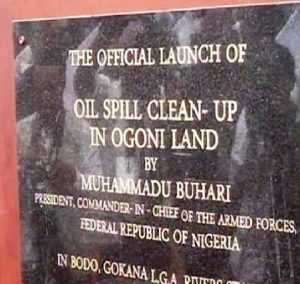 The activities of the Nigerian government in the area of protecting the atmosphere included wiping away the utilisation of ozone depleting substances (ODS), monitoring background atmospheric pollution and the total column ozone, data bank automation, a greenhouse gas inventory, climate change research and training, promotion of environmentally friendly energy practice, and participation in the Global Environment Monitoring Systems (GEMS), since the United Nations Conference on Environment and Development (UNCED).
The activities of the Nigerian government in the area of protecting the atmosphere included wiping away the utilisation of ozone depleting substances (ODS), monitoring background atmospheric pollution and the total column ozone, data bank automation, a greenhouse gas inventory, climate change research and training, promotion of environmentally friendly energy practice, and participation in the Global Environment Monitoring Systems (GEMS), since the United Nations Conference on Environment and Development (UNCED).
The UN was hammering against the sources of gaseous emissions, a situation the Federal Government (FG) promised on Friday, 25 March 2011, that it had set agenda for ending gas flaring and unveiled what was regarded as “ambitious $10bn gas revolution” and to create 500,000 direct and indirect jobs.
The Federal Government (FG) made this disclosure during the formal launching of the Gas Revolution in the country.
The then President Goodluck Jonathan, said: “Today’s event marks the beginning of what I believe will be a fulfilling journey towards the restoration of Nigeria to the league of nations which have successfully leveraged on the advantage derivable from the abundance of natural gas, to positively impact on the lives of present and future generations of their citizens.”
Warning To Nigeria
The UN, however, benchmarked 2010 for compliance to end gaseous emissions. Reviews on emissions that included those of vehicles, generating sets, and aircraft were fad.
The UN through its agency such as UNEP, was creating awareness campaigns at all levels that Nigeria should make use of adequate effective technology, ensuring efficient energy use, maintain effective databases on industries and their compliance status, maintain a register of technologies, vehicles, generating sets, aircrafts, introduce and enforce emission control certificates for vehicles, generating sets, and aircraft by 1999, eliminate ODS consuming processes, enforce laws relating to the siting of new industries, install a minimum of primary treatment for all new industries, build secondary central treatment facilities in all major industrial estates in cities such as Lagos, Kano, Kaduna, Port-Harcourt, Warri, Ibadan, and Enugu by 2005.
The Sustainable Development Knowledge Platform – an arm of the United Nations Department of Economic and Social Affairs – continues in the above to ensure that in Nigeria, there is 100% waste segregation, recycling and re-use by 1999.
The platform also enlightens Nigeria to promote research in Best Available Technology Effective for Local Adoption (BATELA), make eco-labelling compulsory for all products by the year 2000, promote commercialization of sanitary landfill and incineration as appropriate, encourage citizen empowerment in pollution control, introduce green technologies and promote Environmental Management Systems (EMS) in all industrial facilities, create an environment fund for soft loans as economic incentives for environmentally friendly industries, and promote tax rebates for industries installing pollution abatement facilities.
UNEP Report On Ogoni
Ogoni people were in a bid for a second round of their struggle, but UNEP showed commitment in making sure that the environmental degradations caused by the multinational oil companies in Ogoni was resolved.
It was a request by the Federal Government (FG) that the UN agency should investigate the extent of pollution in the region. The UNEP report, on presentation to the then President Jonathan, was adjudged the most detailed scientific study on any area in the Niger Delta.
The presentation of the report was made to the then President Jonathan on August 4, 2011. The UNEP criticised the SPDC and the Nigerian government for contributing to 50 years of pollution in Ogoni-land.
The report of UNEP detailed that 10 out of the 15 examined sites which SPDC had said it has wholly remediated, still has pollution above the SPDC and government remediation charges.
UNEP report found out that, what the people took as potable water had carcinogens, such as benzene, up to 900 times above World Health Organisation (WHO) standards.
The report also revealed that at some places in Ogoni-land, the soil was polluted with hydrocarbons to a depth of five (5) metres.
The report further confirmed that the neglect of environmental pollution laws and sub-standard inspection techniques of the federal authorities had led to the complete degradation of the Ogoni environment, turning the environment into an ecological disaster. Therefore, UNEP held that one billion dollars ($1b) should be spent to clean-up Ogoni.
UN Innovation
The intervention of the UNEP saved the Ogoni from the damning neglect it was suffering over forty years and brought the attention of the world to the area.
The report confronted the Federal Government (FG) and the oil multinationals with the perils the Ogoni people are suffering, because of their nefarious activities in the land.
The report made the world to truly understand that the once supported productive farm lands the people enjoyed, fishing and related activities, were all damaged by the incessant pollutions that are being experienced in the area, which compelled the people to gumboot SPDC out of the place 25 years ago.
Court Awards Payment
In March 2012, the Bodo community in Ogoni had filed a lawsuit against the SPDC in a London High Court and was awarded with a £55 million out-of-court settlement and compensation from the company in 2015.
awarded with a £55 million out-of-court settlement and compensation from the company in 2015.
According to data, “The community had achieved this uncommon feat, working with a pro-development non-governmental organisation, Centre for Environment, Human Rights and Development (CEHRD) and a United Kingdom based law firm, Leigh Day.
“On the payment of the fund, it was agreed that £35 million will be split between those impacted by the spill who will each receive £2,200 (about N600,000) and £20 million will go to the community for the execution of legacy programmes and projects.”
However, President Muhammadu Buhari had in the 2018 budget presentation, said, “We are working hard on the Ogoniland clean-up project, and have engaged eight international and local firms proposing different technologies for the mandate.”
“This would enable us select the best and most suitable technology for the remediation work, and have asked each firm to conduct demonstration clean-up exercises in four local government areas of Ogoniland.”
But President of the Movement for the Survival of Ogoni People (MOSOP), Legborsi Pyagbara was however perturbed that Ogoni people were dying every day; they were still drinking from the polluted water. No choice of theirs.
He frowned over the renewal of pipelines for multinational oil companies in Ogoniland when the clean-up has not been conducted. He added that the authorities should have done the environmental impact assessment of the area before the resumption of any form of oil exploration in the area. He earnestly called on the concerned authorities to ensure quick clean up of the affected communities.
Odimegwu Onwumere is a multiple awards-winning journalist based in Rivers State. Email:[email protected]
https://www.africaprimenews.com/2018/06/08/news/niger-delta-group-gives-oil-company-ultimatum/
